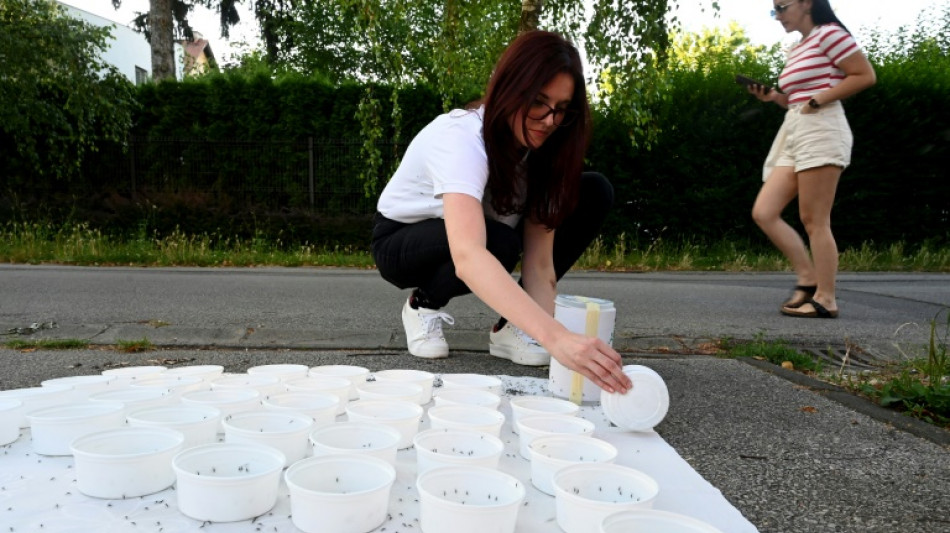
-
 Grand Vietnam parade 50 years after the fall of Saigon
Grand Vietnam parade 50 years after the fall of Saigon
-
Trump fires ex first gentleman Emhoff from Holocaust board

-
 PSG 'not getting carried away' despite holding edge against Arsenal
PSG 'not getting carried away' despite holding edge against Arsenal
-
Cuban dissidents detained after court revokes parole

-
 Sweden stunned by new deadly gun attack
Sweden stunned by new deadly gun attack
-
BRICS blast 'resurgence of protectionism' in Trump era

-
 Trump tempers auto tariffs, winning cautious praise from industry
Trump tempers auto tariffs, winning cautious praise from industry
-
'Cruel measure': Dominican crackdown on Haitian hospitals
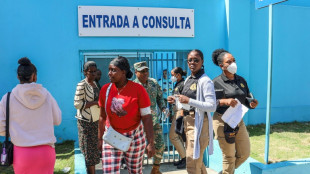
-
 'It's only half-time': Defiant Raya says Arsenal can overturn PSG deficit
'It's only half-time': Defiant Raya says Arsenal can overturn PSG deficit
-
Dembele sinks Arsenal as PSG seize edge in Champions League semi-final

-
 Les Kiss to take over Wallabies coach role from mid-2026
Les Kiss to take over Wallabies coach role from mid-2026
-
Real Madrid's Rudiger, Mendy and Alaba out injured until end of season

-
 US threatens to quit Russia-Ukraine effort unless 'concrete proposals'
US threatens to quit Russia-Ukraine effort unless 'concrete proposals'
-
Meta releases standalone AI app, competing with ChatGPT

-
 Zverev crashes as Swiatek scrapes into Madrid Open quarter-finals
Zverev crashes as Swiatek scrapes into Madrid Open quarter-finals
-
BRICS members blast rise of 'trade protectionism'

-
 Trump praises Bezos as Amazon denies plan to display tariff cost
Trump praises Bezos as Amazon denies plan to display tariff cost
-
France to tax small parcels from China amid tariff fallout fears

-
 Hong Kong releases former opposition lawmakers jailed for subversion
Hong Kong releases former opposition lawmakers jailed for subversion
-
Trump celebrates tumultuous 100 days in office

-
 Sweden gun attack leaves three dead
Sweden gun attack leaves three dead
-
Real Madrid's Rudiger banned for six matches after Copa final red

-
 Firmino, Toney fire Al Ahli into AFC Champions League final
Firmino, Toney fire Al Ahli into AFC Champions League final
-
Maximum respect for Barca but no fear: Inter's Inzaghi

-
 Trump signals relief on auto tariffs as industry awaits details
Trump signals relief on auto tariffs as industry awaits details
-
Cuban court revokes parole of two prominent dissidents

-
 Narine leads from the front as Kolkata trump Delhi in IPL
Narine leads from the front as Kolkata trump Delhi in IPL
-
Amazon says never planned to show tariff costs, after White House backlash

-
 Djokovic to miss Italian Open
Djokovic to miss Italian Open
-
Trossard starts for Arsenal in Champions League semi against PSG

-
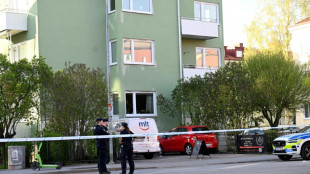 Sweden shooting kills three: police
Sweden shooting kills three: police
-
Real Madrid's Rudiger, Mendy out injured until end of season

-
 Dubois' trainer accuses Usyk of 'conning boxing world'
Dubois' trainer accuses Usyk of 'conning boxing world'
-
Femke Bol targets fast return after draining 2024

-
 Asterix, Obelix and Netflix: US streamer embraces Gallic heroes
Asterix, Obelix and Netflix: US streamer embraces Gallic heroes
-
Watson wins Tour de Romandie prologue, Evenepoel eighth
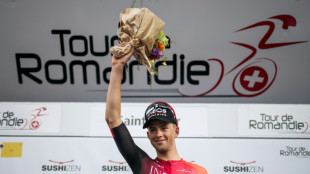
-
 Amazon says never decided to show tariff costs, after White House backlash
Amazon says never decided to show tariff costs, after White House backlash
-
India gives army 'operational freedom' to respond to Kashmir attack

-
 Stocks advance as investors weigh earnings, car tariff hopes
Stocks advance as investors weigh earnings, car tariff hopes
-
Canadian firm makes first bid for international seabed mining license

-
 Kardashian robbery suspect says heist was one 'too many'
Kardashian robbery suspect says heist was one 'too many'
-
'Chilled' Swiatek scrapes into Madrid Open last eight
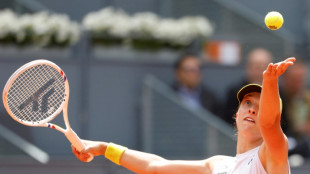
-
 Interconnectivity: the cornerstone of the European electricity network
Interconnectivity: the cornerstone of the European electricity network
-
France accuses Russian military intelligence of cyberattacks

-
 Multiple challenges await Canada's Carney
Multiple challenges await Canada's Carney
-
US consumer confidence hits lowest level since onset of pandemic

-
 How climate change turned Sao Paulo's drizzle into a storm
How climate change turned Sao Paulo's drizzle into a storm
-
Video game rides conclave excitement with cardinal fantasy team

-
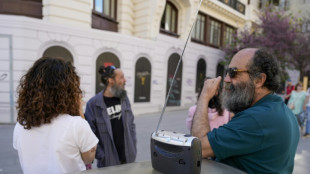 Candles and radios in demand in Spain as blackout lessons sink in
Candles and radios in demand in Spain as blackout lessons sink in
-
Boca Juniors sack coach Gago ahead of Club World Cup


Croatia targets latest climate-change threat: mosquitoes
Hordes of buzzing but sterile mosquitoes are being let loose in Zagreb as Croatia gets ahead of worries that climate change could bring tropical diseases to the Mediterranean nation.
The release is part of a pilot project focused on eradicating invasive Asian Tiger mosquitoes known for carrying sicknesses like Dengue Fever, Chikungunya and Zika.
The species has appeared to thrive in the country and across the region in recent years due in part to climate change -- with the warmer weather providing fertile ground for the mosquito.
"It's too early to say whether this one will yield results," Zagreb resident Kruno Lokotar told AFP. "But I'm glad that we are not just sticking with spraying."
Croatia's effort centres on a method that uses sterilised male mosquitoes -- which once released into the wild will mate with females and neutralise the potential for future offspring.
The Zagreb project kickstarted in June, when 100,000 mosquitoes were released in a high-risk area with thick foliage where mosquitoes often congregate.
"If we release a sufficient number of sterile males during a certain period in an area, the mosquito population in that area will decrease," Ana Klobucar, a medical entomologist of the Zagreb-based teaching institute of public health who is overseeing the project, told AFP.
The plan is rooted in the Sterile Insect Technique (SIT) -- a method that has been used for decades across the world to combat various harmful insects, but is still being tested for its effectiveness against mosquitoes in urban areas.
Croatia started using it for mosquitoes last year in northern Istria peninsula.
This year a total of 1.2 million specially treated insects will be released there over a three-month period, entomologist Nediljko Landeka of the regional public health institute told AFP.
- Climate change impact -
The insects -- which have been rendered sterile after exposure to gamma rays -- are sourced from a laboratory in Italy, and shipped 500 kilometres (310 miles) to Croatia in special boxes.
Once received, Klobucar and her assistants carefully remove plastic bowls with the insects from cardboard tubes before they are later dispersed in local gardens in the target area.
Croatia's programme coincides with increasingly dire warning from experts that global warming could make swaths of Europe more vulnerable to infectious diseases spread by mosquito bites.
The presence of the Asian Tiger mosquito in Croatia was first recorded in 2004 after arriving in Europe in the late 1970s, with experts suggesting they made the journey in used tyres that arrived in Albania from China.
The breed has now spread to more than a dozen European countries, with the Mediterranean region having been hit the hardest, according to official figures.
As the mercury rises across the globe, the Asian Tiger mosquito is moving further north including in areas that were considered too cold for the species to thrive, including in Switzerland and Germany.
"We are afraid that together with the species, viruses could also easily adapt in the future to new environments," warned Greek entomologist Antonios Michaelakis.
Michaelakis -- who is also a researcher at the Benaki Phytopathological Institute in Athens -- has been instrumental in sharing his experiences from a programme in Greece with his Croatian counterparts.
In Greece in 2019, the project succeeded in slashing the population of Asian Tiger mosquitoes by 90 percent, he told AFP.
During a trial of the technique last year in Croatia's Istria, up to 14 percent of mosquito eggs in the area were found to be sterile and jumped to nearly 60 percent this year, Landeka added.
F.Schneider--AMWN

